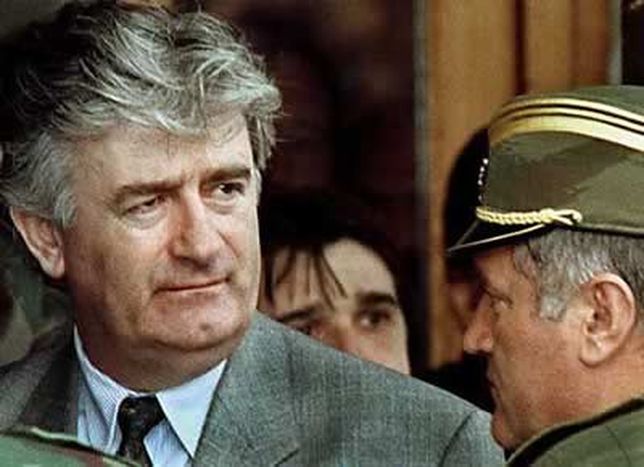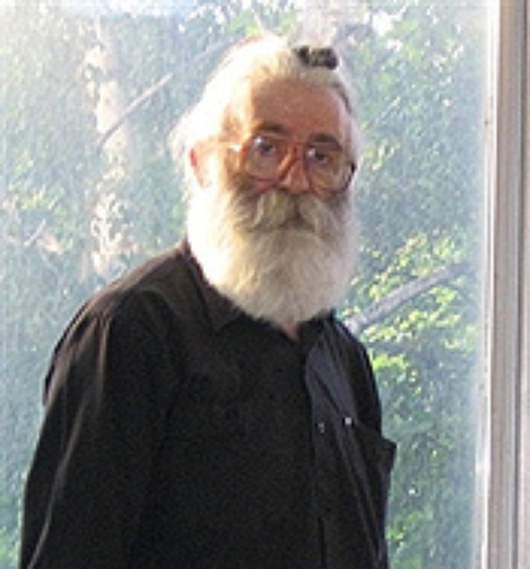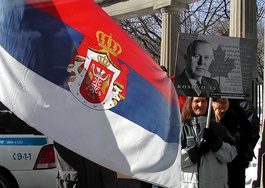
Serbia in the EU: at what cost?
Published on
Translation by:
 jonathan mellor
jonathan mellor
On 30 July captured war criminal Radovan Karadzic was extradited to the Hague. It’s just one sign of Serbia’s desire to be in the European Union, in the hope of better times to come for its wounded pride
On 25 July, Serbia began reinstating its European diplomats, who were removed from European states which recognised former Serb province Kosovo’s declaration of independence in February. The move was announced by the Serbian government after Radovan Karadzic, a former Serbo-Bosnian politician and alleged instigator of the genocide of 8, 000 male, Muslim civilians in Srebrenica in 1995, was arrested in New Belgrade on 21 July. He was flown to the international criminal court in The Hague on 5 July.
Are you for real?
 This all happens two months after the pro–European Serbian political parties (democrats and socialists) took office. EU enlargement minister Olli Rehn has described the events as a ‘foundation stone’ for Serbia’s integration into the EU. Javier Solana, high representative for the common foreign and security policy, considers it a gesture of ‘total cooperation’ on the part of the Serbs.
This all happens two months after the pro–European Serbian political parties (democrats and socialists) took office. EU enlargement minister Olli Rehn has described the events as a ‘foundation stone’ for Serbia’s integration into the EU. Javier Solana, high representative for the common foreign and security policy, considers it a gesture of ‘total cooperation’ on the part of the Serbs.
This breakneck sequence of events hides paradoxes which continue to make it difficult to know whether Serbia has really changed its attitude to its own past and future. For Serb Alexander Mitic, chief analyst at the Institute 4S in Brussels and the only foreign media correspondent during the bombardments of Kosovo in 1999, ‘Since the time of the nationalist conservative Vojislav Kostunica, many fugitives of justice have been detained on charges of war crimes.’ Ricardo Angoso, Spanish coordinator of the NGO Diálogo Europeo (‘European Dialogue’), Balkan expert and UN electoral observer, suggests this reading: ‘Kostunica has publicly opposed handing Serbia war fugitives over to The Hague. According to him, they should be tried by Serbian national justice.’
Entering the EU will cost Serbia
 It’s hard to believe that until the Serb socialist party - founded by Slobodan Milosevic, war criminal and supporter of characters such as Karadzic– came to power, there was no-one who could stop it. The detail is not lost on Ricardo Angoso. ‘Many years have passed since the Milosevic family left many of the socialist party members orphaned. Karadzic was probably protected by the serb secret service. Now that the country is governed by the pro-Europeans president Boris Tadic and finance minster Mirko Cvetkovic, it’s prepared to pay one of the costs of entry into the EU.’ Not long before, the secret service had changed address.
It’s hard to believe that until the Serb socialist party - founded by Slobodan Milosevic, war criminal and supporter of characters such as Karadzic– came to power, there was no-one who could stop it. The detail is not lost on Ricardo Angoso. ‘Many years have passed since the Milosevic family left many of the socialist party members orphaned. Karadzic was probably protected by the serb secret service. Now that the country is governed by the pro-Europeans president Boris Tadic and finance minster Mirko Cvetkovic, it’s prepared to pay one of the costs of entry into the EU.’ Not long before, the secret service had changed address.
'Serbia need to recognise Kosovo' - Ricardo Angoso
‘Serbia will probably also have to detain general Ratko Mladic who is accused of as many crimes as his friend Karadzic,' adds Ricardo Angoso. 'Although being in the military, he is probably protected by the Serb army.' Interior minister and socialist Ivica Dacic has publicly asked that Mladic gives himself up to justice, but probably doesn’t believe it will happen. Holland, the country that most strongly opposes trade deals with Serbia until Mladic is handed over, is standing firm. ‘If I were pressed to comment,’ continues the Spaniard, ‘there is a third bill that needs to be paid before the EU can clasp Serbia to its bosom: the recognition of Kosovo.’ The reinstatement of Serbian ambassadors is understood as taking place in more than 40 states, and European countries like Austria, Belgium, Poland and Denmark.
Two Serbias?
'In Serbia there is no Milosevist social base, like there was Francoism in Spain' - Julie Thisse
So is it a case of two Serbias, like the two polarised Spains that emerged after Franco’s forty year dictatorship which ended in 1975? ‘Not at all,’ explains Ricardo Angoso. ‘In Serbia there is no Milosevist social base, like there was Francoism in Spain.’ Julie Thisse has been working on a training mission in the Serbian justice system in Belgrade on behalf of the French foreign ministry since 2005. ‘They are all nationalists. In Serbia, there is no free-thinking: they are Serbian first, and man or woman, left-wing or right-wing, believer or agnostic etc later.’ ‘Although I don’t doubt that there will be more demonstrations in support of Karadzic, who is considered a martyr by a small minority,’ Alexander Mitic suggests, ‘I don’t think that reflects the general feelings across Serbian society. There is a generation of Serbians born since who barely even know him.’
‘Memories are short,’ says Ricardo Angoso. ‘I sense a great weariness after so many years of economic failure and crises.’ The Serbs thus possibly want to turn a new page in their history. What is true is that it is developing trade links with its Balkan neighbours, such as Croatia and Slovenia. On the other hand, Alexander Mitic feels that these neighbours are not quite so interested in reconciliation with Serbia, ‘but rather getting payback.' 'Beware Albanian nationalism,’ warns Ricardo Angoso. ‘It is growing in Kosovo and Macedonia. In terms of EU integration, it’s the most dangerous of the region. That will be a subject for discussion in the future.’
Serbia’s open wounds
'Recognising Kosovo undermined many Serbs' confidence in Europe' - Alexander Mitic
‘Anger and sadness’ is what Ricardo Angoso feels in the face of what he considers the ‘double whammy’ of the oversimplified criminalisation of Serbia to the exclusion of others. ‘No-one has criticised the now-deceased first Croatian president Franjo Tudjman, nor the Bosnian leader Alija Izetbegovic. Responsibility for the war crimes committed in the Balkan conflict has been put in a kind of hierarchy, to the detriment of Serbia.’ Mitic adds that 'Serbia is bleeding from its wounds. It is the country with most refugees, it has had part of its territory removed illegally, and notorious war criminals against Serbia such as Kosovar Ramush Haradinaj and Bosnian Naser Oric have been absolved by international justice. Kosovar accession, accepted by the EU, has undermined many Serb’s confidence in Europe,’ he concludes. ‘They see it as a betrayal of the community’s values.’
Translated from Serbia en la UE: la cuenta, por favor


